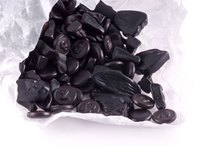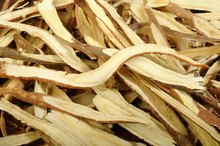Natural Alternatives to Nexium
Esomeprazole, known by the brand Nexium, is a prescription medication that reduces stomach acid production. Doctors prescribe this proton pump inhibitor to relieve chronic heartburn associated with gastroesophageal reflux disease, and to promote healing of erosive esophagitis, or damage to the esophagus caused by stomach acid washing upward. Nexium also can prevent or treat ulcers caused by Helicobacter pylori bacteria or the use of nonsteroidal anti-inflammatory drugs, according to Drugs.com. You may be looking for a natural alternative to avoid side effects associated with Nexium, such as headache and digestive problems. Some herbal remedies might help.
If you are experiencing serious medical symptoms, seek emergency treatment immediately.
Licorice
Deglycyrrhizinated licorice may help treat peptic ulcers and GERD, according to the University of Maryland Medical Center 12. The UMMC advises people with these conditions not to take licorice that includes glycyrrhiza, because that component can cause serious side effects. Look for the abbreviation DGL on the label. The UMMC cites a study in which 100 participants with gastric ulcers took licorice root liquid extract for six weeks. Most of these patients had not improved during previous attempts with conventional medication. A total of 22 patients experienced complete disappearance of the ulcer, while 90 percent experienced improvement.
Components of licorice called flavonoids kill H. pylori bacteria in test tubes, according to the University of Michigan Health System 1. Chewable DGL tablets are available for healing stomach and intestinal ulcers, and the UMHS notes that capsules may not be effective for this purpose because DGL must mix with saliva for activation.
Additionally, preliminary research indicates that an herbal formula called Iberogast, which contains licorice and eight other herbs, may help relieve GERD symptoms, according to the UMMC.
- Deglycyrrhizinated licorice may help treat peptic ulcers and GERD, according to the University of Maryland Medical Center 1.
- Additionally, preliminary research indicates that an herbal formula called Iberogast, which contains licorice and eight other herbs, may help relieve GERD symptoms, according to the UMMC.
Slippery Elm
Herbal Alternatives to Prilosec
Learn More
Slippery elm is another possible natural alternative to Nexium. This herb contains mucilage, a gel-like substance that coats and soothes the mouth, throat and digestive tract, according to the UMMC. Mucilage appears to prevent damaging effects of stomach acid on the esophagus. Slippery elm also causes increased mucus secretion in the digestive tract, which can protect against ulcers and excess acidity. You can take slippery elm as a tea, tincture, lozenge or capsule.
- Slippery elm is another possible natural alternative to Nexium.
- Slippery elm also causes increased mucus secretion in the digestive tract, which can protect against ulcers and excess acidity.
Marshmallow
Another herb that contains mucilage is marshmallow. This herb is most commonly used to soothe irritated mucous membranes in the respiratory and digestive systems, according to the UMHS, including treating indigestion and symptoms of ulcers. For these purposes, you can take marshmallow as a hot or cold tea, a tincture or in capsule form.
Related Articles
References
- University of Maryland Medical Center: Licorice
- University of Maryland Medical Center: Slippery Elm
- Nahidi F, Zare E, Mojab F, Alavi-Majd H. Effects of licorice on relief and recurrence of menopausal hot flashes. Iranian Journal of Pharmaceutical Research: IJPR. 2012;11(2):541-8.
- Irani M, Sarmadi M, Bernard F, Ebrahimi Pour GH, Shaker Bazarnov H. Leaves antimicrobial activity of Glycyrrhiza glabra L. Iranian Journal of Pharmaceutical Research: IJPR. 2010;9(4):425-8.
- NIH National Center for Complementary and Integrative Health. Licorice root. Updated December 1, 2016.
- Raveendra KR, Jayachandra, Srinivasa V, et al. An extract of glycyrrhiza glabra (GutGard)alleviates symptoms of functional dyspepsia: a randomized, double-blind, placebo-controlled study. Evidence-Based Complementary and Alternative Medicine. 2012;2012:1-9. doi:10.1155/2012/216970
- Messier C, Epifano F, Genovese S, Grenier D. Licorice and its potential beneficial effects in common oro-dental diseases. Oral Dis. 2012;18(1):32-39. doi:10.1111/j.1601-0825.2011.01842.x
- Shi Q, Hou Y, Yang Y, Bai G. Protective effects of glycyrrhizin against β2-adrenergic receptor agonist-induced receptor internalization and cell apoptosis. Biol. Pharm. Bull. 2011;34(5):609-617. doi:10.1248/bpb.34.609
- Tsao S, Yin M. Antioxidative and antiinflammatory activities of asiatic acid, glycyrrhizic Acid, and oleanolic acid in human bronchial epithelial cells. J. Agric. Food Chem. 2015;63(12):3196-3204.
- Zhao H, Zhang X, Chen X, et al. Isoliquiritigenin, a flavonoid from licorice, blocks M2 macrophage polarization in colitis-associated tumorigenesis through downregulating PGE2 and IL-6. Toxicology and Applied Pharmacology. 2014;279(3):311-321. doi:10.1016/j.taap.2014.07.001
- Nahidi F, Zare E, Mojab F, Alavi-Majd H. Effects of licorice on relief and recurrence of menopausal hot flashes. Iranian Journal of Pharmaceutical Research: IJPR. 2012;11(2):541-8.
- Hajiaghamohammadi AA, Zargar A, Oveisi S, Samimi R, Reisian S. To evaluate of the effect of adding licorice to the standard treatment regimen of helicobacter pylori. The Brazilian Journal of Infectious Diseases. 2016;20(6):534-538. doi: 10.1016/j.bjid.2016.07.015
- Irani M, Sarmadi M, Bernard F, Ebrahimi Pour GH, Shaker Bazarnov H. Leaves antimicrobial activity of Glycyrrhiza glabra L. Iranian Journal of Pharmaceutical Research: IJPR. 2010;9(4):425-8.
- Penn State Hershey Milton S. Hershey Medical Center. Licorice.
- Omar HR, Komarova I, El-Ghonemi M, et al. Licorice abuse: time to send a warning message. Therapeutic Advances in Endocrinology. 2012;3(4):125-138. doi:10.1177/2042018812454322
- Räikkönen K, Martikainen S, Pesonen A, et al. Maternal licorice consumption during pregnancy and pubertal, cognitive, and psychiatric outcomes in children. Am J Epidemiol. 2017;185(5):317-328. doi:10.1093/aje/kww172
- Consumer Reports. Food and drug interactions you need to know about. Updated November 4, 2018.
- Winchester Hospital. Library. Updated April 11, 2011.
- Consumer Reports. How to choose supplements wisely. Updated October 30, 2019.
- FDA. Black licorice: Trick or treat? Updated November 6, 2017.
Resources
Writer Bio
Shelley Moore is a journalist and award-winning short-story writer. She specializes in writing about personal development, health, careers and personal finance. Moore has been published in "Family Circle" magazine and the "Milwaukee Sentinel" newspaper, along with numerous other national and regional magazines, daily and weekly newspapers and corporate publications. She has a Bachelor of Science in psychology.









